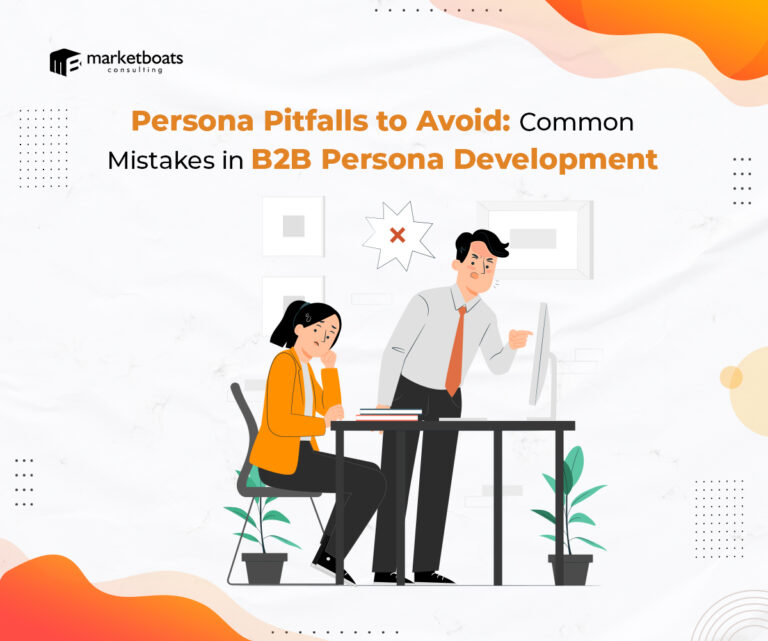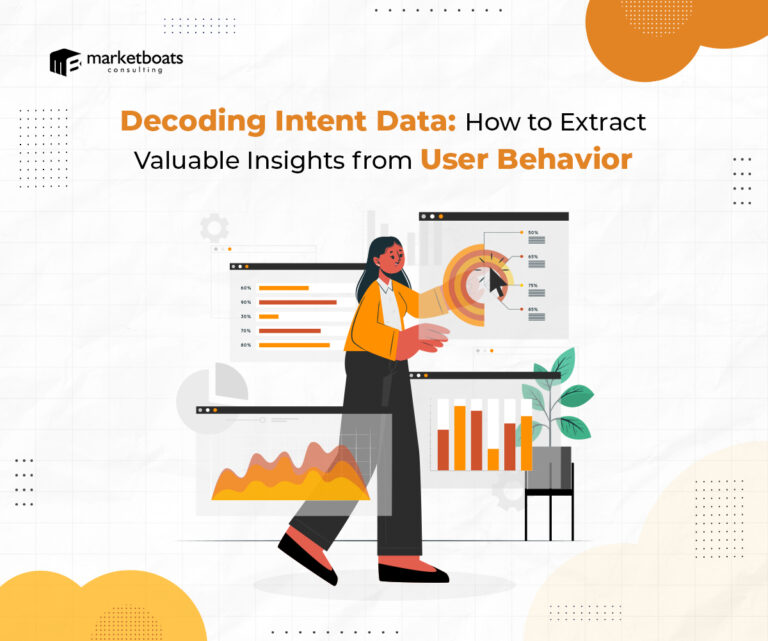Have you ever gone through travel websites and been bombarded with hotel ads for the coming weeks afterward? Or perhaps you casually searched about a new fitness tracker, only to suddenly find yourself on social media posts promoting similar devices?
This targeted marketing approach is what we call Intent Data!
About 50% of marketers follow responsible intent data practices to identify high-quality leads and improve account prioritization. Intent data has changed the way marketers look at campaign development today. However, intent data and consumer privacy are something that need to be prioritized and demand a responsible approach.
So, in this blog, we will help you navigate through the world of ethical intent data usage. We’ll explore its power in understanding customer needs, delve into the evolving privacy landscape, and most importantly, guide you on leveraging intent data ethically.
The Evolving Privacy Landscape
Let’s say you’re a marketing manager for a sporting goods store. You discover intent data indicating a surge in online searches for running shoes and training programs. This suggests a rise in people’s interest in taking up running. Armed with this knowledge, you can launch targeted marketing campaigns promoting your running shoes and training gear, reaching out to potential customers at the exact moment they’re considering a purchase.
Intent data analyzes this online footprint to gauge a user’s purchase intent. It goes beyond demographics and explores browsing behavior, website visits, content downloads, and even social media interactions. By analyzing these activities, marketers can understand what a potential customer is interested in and at what stage of the buying journey they are.
While intent data offers benefits, navigating privacy in marketing raises concerns about consumer privacy. Key existing laws that impact marketing strategies globally include:
- General Data Protection Regulation (GDPR): Enforced in the EU, GDPR dictates strict guidelines for data collection, processing, and consent, necessitating transparency and accountability in marketing practices.
- California Consumer Privacy Act (CCPA): Empowers Californian consumers with rights over their personal data and imposes obligations on businesses, influencing how data is handled for marketing purposes.
- Personal Information Protection and Electronic Documents Act (PIPEDA): Governs the use of personal data by private-sector organizations in Canada, shaping data practices for marketers.
These laws have profound implications for marketing strategies, necessitating ethical data practices and consumer-focused approaches. Emerging privacy regulations pose compliance challenges, including:
- Increased consumer expectations for transparency and control over data.
- Stricter consent requirements and limitations on data usage.
To remain compliant and competitive, marketers need to comply with these regulatory nuances, adopting ethical use of behavioral data practices that resonate with both the legal framework and the expectations of the digital consumer. In doing so, they can forge a path that respects individual privacy rights while still harnessing the power of data-driven marketing to achieve business objectives.
The Ethical Challenges
While intent data offers powerful marketing insights, it raises concerns about consumer privacy. 68% of consumers globally are worried about the amount of data companies collect about them.
Here’s a look at some of the ethical challenges and how you can safeguard yourself from it:
Consent and Transparency: Privacy-conscious intent marketing often relies on user activity tracking across various platforms. While some users might be comfortable with this, current practices often lack transparency, making it difficult for users to understand how their data is collected and used.
This lack of transparency can lead to feelings of intrusion and a distrust of marketing practices. To address this, you should opt for explicit user consent, clearly outlining how data is collected and informing users of their control over its use.
Data Accuracy: The effectiveness of intent data hinges on its accuracy. Inaccurate data can lead to biased marketing campaigns that exclude certain demographics or misrepresent user needs. This can not only be ineffective but also discriminatory. You must ensure their data sources are reputable and employ methods to verify and update data regularly.
Data Security: Data breaches are a constant threat. As marketers increasingly leverage intent data, robust security measures become even more critical. Data breaches can expose sensitive user information and erode trust in brands. Businesses must prioritize data security by implementing strong encryption methods, and access controls, and adhering to industry best practices.
Profiling and Personalization: Intent data allows for highly targeted marketing profiles. While this can lead to more relevant ads, it can also create “filter bubbles” where users are only exposed to information that confirms their existing beliefs. This can limit user exposure to diverse viewpoints and hinder informed decision-making.
Ideally, you should strive for a balance between personalization and promoting exposure to a variety of perspectives. Techniques like showcasing a curated selection of relevant content alongside user-generated content or alternative viewpoints can help achieve this balance.
Data Retention: Platforms collect vast amounts of intent data. However, retaining outdated or irrelevant data can be unethical. Over time, user needs and interests evolve. Targeting users based on old data can lead to irrelevant and even misleading marketing messages. You should establish clear data retention policies with set timeframes for deleting outdated data or offering users the option to opt out of data storage entirely.
By acknowledging these ethical challenges and implementing responsible data practices, you can leverage the power of intent data to deliver effective and trustworthy marketing campaigns that respect user privacy.
Ways to Leveraging Intent Data Ethically
Leveraging intent data ethically is not just a legal requirement but a crucial aspect of building trust and maintaining customer relationships.
Here’s how you can navigate this terrain effectively with some of the following responsible intent data practices:
Understanding Ethical Boundaries in Utilizing Customer Data
It’s vital to recognize the fine line between useful personalization and invasive surveillance. A survey found that 72% of customers expect companies to understand their needs and expectations without infringing on their privacy.
Therefore, marketers must define and adhere to ethical guidelines that respect customer boundaries while providing relevant and personalized experiences.
Implementing Transparent Data Collection and Usage Policies
Transparency in how customer data is collected, used, and shared is foundational to ethical marketing. Intent data and consumer privacy should ideally go hand in hand. According to a market study, 81% of the consumer base says that the potential risks they face because of data collection by companies outweigh the benefits.
To counteract this distrust, businesses should develop clear privacy policies that detail data handling practices and communicate these openly with customers.
Obtaining Explicit Consent for Data Collection and Processing
The essence of ethical data use lies in consent. A GDPR report highlights that 90% of consumers agree that it’s important to have control over how personal information is collected and used.
To beat the same, one should ensure that consent is freely given, specific, informed, and unambiguous, requiring a proactive approach to obtaining clear and affirmative agreement from customers before collecting their data.
Anonymizing and Securing Sensitive Customer Information
With data breaches on the rise, securing and anonymizing personal data is paramount. The IBM Cost of a Data Breach Report 2020 states that the average cost of a data breach is $3.86 million, emphasizing the high stakes involved.
Businesses must employ unbeatable encryption and anonymization techniques to protect customer data from unauthorized access. They should further ensure that even if data is compromised, it cannot be traced back to an individual.
Tailoring Marketing Strategies Without Compromising Privacy
Finally, creating marketing strategies that are respectful of privacy yet effective in reaching the target audience is essential. This means leveraging intent data to provide value and enhance the customer experience without overstepping privacy boundaries.
For example, instead of bombarding customers with irrelevant ads, you can use intent data to offer useful content, product recommendations, and personalized experiences that genuinely meet the customer’s needs and interests.
Conclusion
In the ever-changing world of marketing, intent data offers a powerful tool to understand customer needs. However, ethical considerations and evolving privacy regulations demand a responsible approach. Marketboats Consulting can be your guide. We’ll help you harness the power of intent data while prioritizing user privacy.
Partner with Marketboats today! We’ll equip you with the tools and expertise to leverage intent data ethically, reach the right audience with the right message, and build stronger customer relationships that fuel long-term success.
Contact us today!





